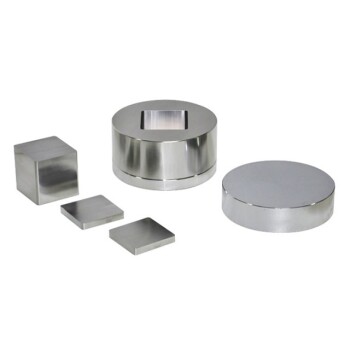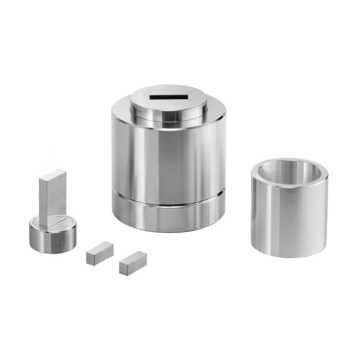At its core, a laboratory press is used for three primary functions: preparing consistent samples for analysis, testing the physical properties of materials, and simulating large-scale industrial processes in a controlled, small-scale environment. It is an essential tool in research, development, and quality control, valued for its ability to apply precise force and temperature to a wide range of substances.
A lab press is more than just a tool for compression. It is a critical bridge between foundational research and real-world production, enabling the precise manipulation of materials in a way that generates reliable data and accelerates innovation.

The Core Applications: From Sample Prep to R&D
A laboratory press is defined by its function. While it simply applies force, this capability is leveraged for several distinct purposes across scientific and industrial settings.
Preparing Samples for Analysis
One of the most common uses of a lab press is preparing solid samples for spectroscopic analysis.
Techniques like FTIR (Fourier Transform Infrared Spectroscopy) and XRF (X-ray Fluorescence) require samples to be uniform and consistent to produce accurate results. A lab press excels at compressing powdered materials, such as a compound mixed with KBr, into smooth, thin pellets or films.
This process eliminates inconsistencies in sample density and surface texture that could otherwise distort analytical measurements, ensuring the data collected is reliable and repeatable.
Testing Material Properties
In materials science and quality control, a press is used to investigate the fundamental properties of a substance.
By applying a known amount of compressive force, researchers can test a material's strength, durability, and response to stress. This is critical for evaluating new polymers, composites, ceramics, or alloys.
The press can also be used for tension testing or to study the effects of high pressure on a substance's chemical structure and behavior, providing essential data for developing robust new products.
Simulating Production Processes
Laboratory presses serve as miniature versions of large, industrial production presses. This allows for efficient research and development (R&D).
Instead of committing time and resources to a full-scale production run, engineers can use a lab press to test and refine processes like molding, laminating, forming, and extrusion.
This small-scale simulation provides invaluable data on process efficiency and material performance, guiding the development of manufacturing methods before they are deployed on the factory floor.
How a Laboratory Press Achieves Control
The value of a lab press comes from its ability to precisely control the two most important variables in material transformation: force and temperature.
The Role of Hydraulic Force
Most laboratory presses are hydraulic, meaning they use a fluid to transmit and multiply force. This allows even compact benchtop units to generate immense compressive loads, typically ranging from 15 to over 100 tons. This force is applied evenly across the surface of the platens.
The Importance of Heated Platens
Many applications, particularly with polymers and composites, require heat. Lab presses often feature integrated heated platens that can reach temperatures from 600°F to 1200°F (approx. 315°C to 650°C).
This allows for processes like curing thermoset plastics, molding thermoplastics, or laminating layers of material under precise thermal conditions.
Understanding the Trade-offs and Limitations
While incredibly versatile, it is important to recognize the limitations of a laboratory press to use it effectively.
Scale Remains a Factor
A lab press is a simulation, not a perfect replica. It cannot fully account for all the dynamic variables of a massive production line, such as material flow over large surface areas or the precise cooling rates within a multi-ton mold.
The data gathered is a guideline, which must be intelligently extrapolated for full-scale production.
Throughput is Not the Goal
Laboratory presses are designed for precision, data collection, and short, experimental runs. They are not built for high-volume manufacturing. Their value lies in the quality of the sample or result, not the quantity.
Operator Skill is Often Required
Many lab presses, especially simpler manual models, rely on the operator to ensure consistency. Achieving repeatable results for pressure application and timing can require significant skill and careful documentation of the procedure.
Making the Right Choice for Your Goal
The optimal use of a laboratory press depends entirely on your final objective.
- If your primary focus is analytical chemistry: Use the press to create highly uniform pellets for FTIR or XRF, eliminating sample-to-sample variability and ensuring the most accurate spectroscopic data.
- If your primary focus is materials R&D: Leverage the press to test the compressive strength of new materials and simulate molding or lamination processes to refine your formulation before scaling up.
- If your primary focus is quality control: Employ the press to prepare samples from production batches for standardized testing, confirming that your material consistently meets strength and durability specifications.
By understanding its function as a tool for controlled force and temperature, you can leverage the laboratory press to accelerate discovery and guarantee quality.
Summary Table:
| Application | Key Uses | Benefits |
|---|---|---|
| Sample Preparation | Creating pellets for FTIR/XRF analysis | Ensures uniform, consistent samples for accurate results |
| Material Testing | Assessing strength, durability, and stress response | Provides reliable data for R&D and quality control |
| Process Simulation | Modeling molding, laminating, and forming | Enables small-scale testing to guide industrial production |
Ready to enhance your lab's precision and efficiency? KINTEK specializes in lab press machines, including automatic lab presses, isostatic presses, and heated lab presses, designed to meet your laboratory needs for sample preparation, material testing, and process simulation. Our equipment delivers precise force and temperature control, helping you achieve reliable data and accelerate innovation. Contact us today to discuss how our solutions can benefit your research and development!
Visual Guide

Related Products
- Automatic Laboratory Hydraulic Press Lab Pellet Press Machine
- Laboratory Hydraulic Press 2T Lab Pellet Press for KBR FTIR
- Manual Laboratory Hydraulic Press Lab Pellet Press
- Automatic Laboratory Hydraulic Press for XRF and KBR Pellet Pressing
- Manual Heated Hydraulic Lab Press with Integrated Hot Plates Hydraulic Press Machine
People Also Ask
- How are hydraulic pellet presses used in educational and industrial settings? Boost Efficiency in Labs and Workshops
- How does a hydraulic press aid in XRF spectroscopy? Achieve Accurate Elemental Analysis with Reliable Sample Prep
- How do hydraulic press machines ensure precision and consistency in pressure application? Achieve Reliable Force Control for Your Lab
- What is the purpose of creating pellets for XRF spectroscopy using a hydraulic press? Ensure Accurate and Repeatable Elemental Analysis
- What are the advantages of using a hydraulic press for pellet production? Achieve Consistent, High-Quality Samples



















